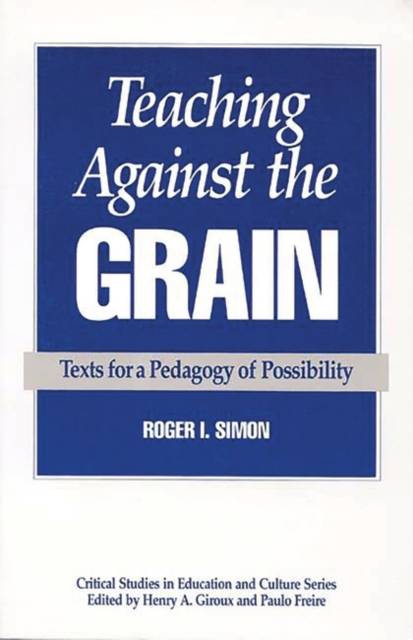
- Afhalen na 1 uur in een winkel met voorraad
- Gratis thuislevering in België vanaf € 30
- Ruim aanbod met 7 miljoen producten
- Afhalen na 1 uur in een winkel met voorraad
- Gratis thuislevering in België vanaf € 30
- Ruim aanbod met 7 miljoen producten
Omschrijving
Conceiving of pedagogy as a form of cultural politics and teachers, therefore, as cultural workers, Simon offers a fresh vision of the notion of pedagogy. Grounded in an ethical and political stance devoted to the advancement of human dignity, Simon reflexively considers the basis on which teachers form their own dispositions and feelings, and urges them to consider not only what they might do as teachers but what social visions are supported by their practices. In this in-depth discussion of the requirements for a pedagogy of possibility, Simon highlights the significance of his theoretical commitment as applied to educational practice.
To illustrate the ways that pedagogy is implicated in the construction of a social imaginary, Simon explores how the substance of schooling might be recast in a way that involves the work of teaching in reconstituting a progressive moral project for education that can constitute part of a broadly based social transformation. He subsequently offers a social vision on which a pedagogy of possibility might be founded, and shows how schools, along with other sites of cultural production, may be understood as integral to the struggle to establish such a vision. In addition, he discusses in detail how a practice of pedagogy might be conceptualized that would help establish concrete forms of hopeful practice.Specificaties
Betrokkenen
- Auteur(s):
- Uitgeverij:
Inhoud
- Aantal bladzijden:
- 192
- Taal:
- Engels
- Reeks:
Eigenschappen
- Productcode (EAN):
- 9780897892063
- Verschijningsdatum:
- 20/04/1992
- Uitvoering:
- Paperback
- Formaat:
- Trade paperback (VS)
- Afmetingen:
- 156 mm x 234 mm
- Gewicht:
- 312 g

Alleen bij Standaard Boekhandel
Beoordelingen
We publiceren alleen reviews die voldoen aan de voorwaarden voor reviews. Bekijk onze voorwaarden voor reviews.











